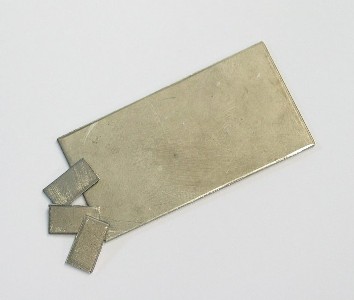Niobium

|
| Name |
Niobium |
| Symbol |
Nb |
| Atomic Number |
41 |
| Atomic Mass |
92.90638 atomic mass units |
| Number of Protons |
41 |
| Number of Neutrons |
52 |
| Number of Electrons |
41 |
| Melting Point |
2468.0° C |
| Boiling Point |
4927.0° C |
| Density |
8.57 grams per cubic centimeter |
| Normal Phase |
Solid |
| Family |
Transition Metal |
| Period |
5 |
| Cost |
$75 per pound |
| Origin of Name |
After Niobe, daughter of the mythical king, Tantalus |
| Date and Place of Discovery |
In 1801 in America |
| Discovered by |
Charles Hatchett |
| Common Compounds |
|
| Interesting facts |
- It was once called
columbium.
- It is found freely in nature in abundance.
- Tantalum and niobium is found in
columbite and
tantalite and it is difficult to separate them.
- It is a rare, soft, malleable, ductile, gray-white metal.
- It is sometimes confused with tantalum.
- It reacts easily at high temperatures with oxygen, carbon, most halogens, nitrogen, and
sulfur.
- When processing, it must be kept in a controlled atmosphere.
|
| Common Uses |
- Stainless steel
- Cutting tools
- Advanced engineering systems used in the Gemini space program
- Superconductive magnets
- Body art (navel rings)
- Pacemakers
- Artificial joints
- Dental implants
|
|